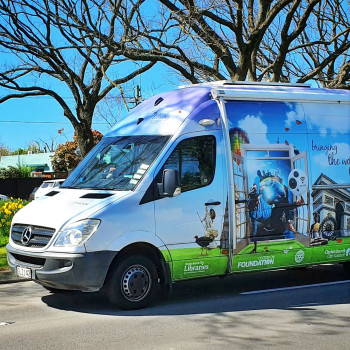
New look for Mobile Library service

Share this story
Christchurch City Libraries is developing a hybrid model for its Mobile Library service.
“Over recent years the Mobile Library has seen a decline in patronage,” says Christchurch City Council Head of Libraries and Information, Carolyn Robertson.
“Our staff have engaged closely with our Mobile Library users and we think a hybrid model is the best way forward to ensure all customers can continue to have free and equitable access to library services.
“We’re determined to do everything we can to make sure customers who may be housebound, have limited physical access or face other barriers will continue to enjoy a high-quality, personalised library service.”

Declining patronage has led to the development of a hybrid model offering expanded Outreach Services and a personalised service for who have difficulty travelling.
Targeted engagement conducted with 110 current Mobile Library customers showed one third (32%) visited another library regularly or sometimes; one third visited another library when the mobile service was off the road due to COVID-19 restrictions and 34% did not visit other libraries at all.
Two thirds of customers (64%) indicated they would visit a different library if the mobile service stopped.
Ms Robertson says the new hybrid model would set up a range of service options.
“Under this model we’d look to offer a personalised service to our library customers who may be housebound or have difficulty travelling. This would allow them to interact with a librarian who knows their individual interests and can cater to their needs.
“We’d also look to expand our existing Outreach Services to partner with a greater number of retirement homes, rest homes, pre-schools and social housing providers. Setting up small on-site libraries with material that we can regularly rotate is a proven and effective way to provide a tailored service for our customers,” says Ms Robertson.
Staff will help those who currently use both the mobile service and one or more libraries to become more familiar and confident with their library of choice.
The Council is developing a detailed plan to transition the service from the current schedule of stops to the new hybrid model from 1 July this year. It’s expected to take 12 months to fully implement the changes.
